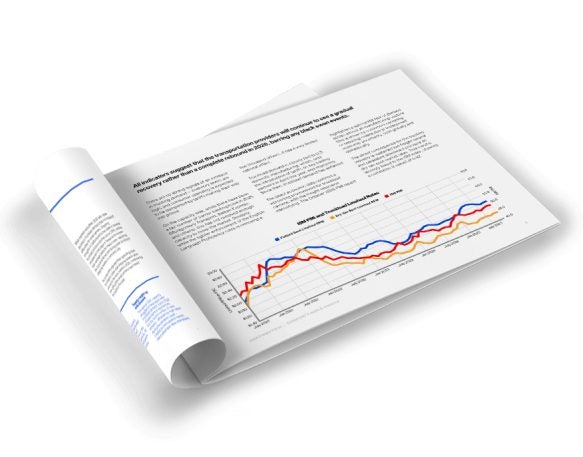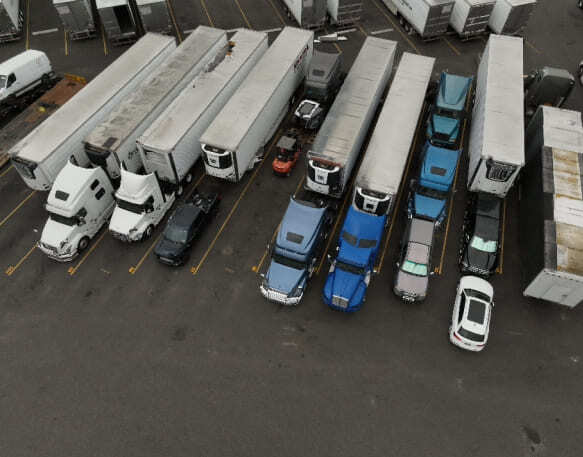The good news is that we have digital load matching these days. Not only is it faster than manual load matching, but it’s also just easier than traditional freight matching techniques. So, say goodbye to the headaches of doing everything manually and let a digital load matching platform handle it.
Here’s what you need to know about load matching and how it can help brokers and shippers.
What is digital load matching?
Brokers and shippers might want to know more about the DFM meaning. Also known as digital freight matching or DFM, digital load matching is the newest way to connect carriers with loads. In short, DFM means using mobile-based or web-based platforms to match loads with trucks. Shippers and brokers can simply post the shipments that they need to move. Then, carriers can search for freight that meets their load requirements and make the booking on the spot.
DFM makes connecting shipper freight to carrier capacity fast and easy, saving everyone valuable time, energy, and frustration. In fact, DFM is often affectionately referred to as “Uber for trucking” due to how easy it makes connecting brokers and shippers to quality carriers!
The best digital freight marketplaces use artificial intelligence and machine learning-based predictive analytics to match carriers with brokers’ and shippers’ loads. As a result, everyone is aligned on the capacity, cost, efficiency, service requirements, route, and destination from the get-go. Digital freight matching ensures that each load delivery is as efficient and profitable as possible for everyone involved and no one gets the short end of the stick.
How does DFM work?
DFM streamlines the load matching process, making it easier for shippers, brokers, and carriers to find each other. It uses machine learning, artificial intelligence, process algorithms, and Application Programming Interface-based technology to match brokers and shippers with the right trucks.
Brokers and shippers can use DFM platforms to quickly find carriers that meet their lane, truck type, and availability requirements. They can also post a load along with information that prospective drivers need to know, such as the weight of the cargo, the pick-up and drop-off locations and dates, and the proposed rate and wait for carriers to come to them. Once a carrier filters through the available loads and finds one that meets their needs, they can book the load immediately at the pre-posted rate and hit the road. Either way, digital freight matching makes locating capacity in real-time not only possible but fast.
Digital freight matching platforms generally consider the route and load’s needs. For example, DFM software will group shipments headed to the same city or with destinations along the same path together. This way, a carrier won’t have to drive out of their way to deliver a load, and everything can be completed in less time and with less fuel. Some DFM platforms even consider the vehicle’s height and weight when suggesting loads and planning a route, as some bridges have weight limitations while some tunnels may be too short for particular trucks. On the load side of things, DFM considers the load’s fragility, weight, and temperature requirements when determining the best possible route and vehicle type.
How does digital load matching help brokers and shippers?
More and more brokers are turning to digital load matching — and with good reason. DFM has plenty to offer! While the exact benefits vary from platform to platform, you can expect a few things from nearly all digital freight matching tools. Expect:
To save time
DFM is a game-changer when it comes to your time. Instead of spending hours posting to truck stop bulletin boards, calling up carriers, or corresponding via email, you can get matches in minutes. What’s more, a quality digital freight brokerage can use artificial intelligence and machine learning to make matches instantly or make predictive matches.
In short, DFM solutions can significantly reduce the time shippers and brokers wait to find a load match, but that’s not all. Load matching tools can also often integrate with smartphones or tracking devices on vehicles, giving shippers and brokers the ability to check in on a load’s location in real-time at any given moment. Instead of calling the carrier, they can simply check their phone or computer. This data can also help inform future routes and ensure loads get to their destination as quickly as possible.
To find drivers
It isn’t always easy to find carriers, especially these days. The shortage of truck drivers peaked in 2021 with a record shortage of 81,258 drivers, but we aren’t out of the woods yet. The American Trucking Association believes that the truck driver shortage will be nearly 78,000 drivers this year (and may reach 160,000 by 2028), so brokers and shippers may still face difficulties finding cargo carriers.
Luckily, digital load matching tools make finding drivers much more manageable. Shippers and brokers can access a large selection of carriers from a single location. Plus, many younger truck drivers love online loadmatch load boards, as do drivers that prefer short-term contracts. And it makes sense. Carriers can just tap to accept loads and go with no negotiation required. So, by using a digital freight marketplace, shippers and brokers can access hundreds of thousands of more drivers, even amid the ongoing truck driver shortage.
To save money
DFM can save carriers, shippers, and brokers lots of money. For carriers, freight matching platforms make planning efficient routes easy, reduce empty miles, and lower fuel costs.
Plus, the right DFM tool can save lots of time on the broker and shipper side. Instead of paying employees to spend hours matching loads, they can invest in a quality digital freight matching solution that can do it in seconds. Then, they can assign their employees to more profitable and business-critical tasks.
To have less administrative work
Administrative work is tedious and time-consuming, but the right DFM tool can drastically reduce the time you need to spend handling administrative duties. After all, most freight matching platforms are powered by Application Programming Interfaces and can integrate several processes. As a result, you no longer have to do all the manual processes. Instead, you can accomplish all your tasks through a single platform capable of automating many daily chores, such as tracking data or making payments. These will help your business and improve carriers’ lives and help ensure the world’s supply chains function as smoothly as possible.
How to choose a DFM
There are countless digital freight matching platforms, but some are better than others. While the right DFM can benefit your shipper or broker business in numerous ways, the wrong one can waste your time and money and even hurt your company. So, you must do your due diligence before selecting your DFM, but what exactly should you look for?
For one, you’ll want something with a user-friendly interface. If you or your employees can’t quickly use your chosen DFM software because it’s unreliable or confusing, that defeats the point of digital freight matching. After all, you want to make your life easier and increase efficiency. If you’re unsure of a DFM solution, see if they have a demo you can watch or even a free trial period before you make up your mind. If not, make sure to read the reviews carefully.
You’ll also want to pick a DFM solution with a quick and easy booking process. After all, if you choose one that has a slow or overly complicated booking process, you’ll lose valuable time with every load. It won’t be worth the time or money.
Make sure to select a secure platform so you can rest easy knowing all payment information is protected, and don’t forget to see how extensive the platform’s carrier network is. It won’t matter if the freight matching software is easy-to-use if there aren’t any drivers using it! Try to narrow down your DFM tool search to options with over 75,000 carriers that haul more than 10,000 shipments a day to ensure you meet your shipping needs.
You’ll also want to look at freight matching platforms you can access on the go. It’s best to select something with a multi-functional app so you and your employees can access everything in one place, no matter where you are physically located. If possible, find a digital freight marketplace that features in-app payment or another quick-pay option, load board functionality, load tracking, and integration with other tools.
Another thing to consider is whether your DFM solution gives you access to specialists who can help resolve problems. After all, relying 100% on technology can be a recipe for disaster, especially if you’re unfamiliar with the platform.
Finally, you’ll want a load matching tool that is intelligent. DFM platforms that rely on artificial intelligence and machine learning can help optimize your carrier networks, improve load scheduling, and plan more efficient routes. With the right DFM on your side, you can reduce costs, gain meaningful insights from data, and find drivers with the right expertise, capacity, and areas of operation for your cargo.
How to get load matching with DAT
If you’re looking for a DFM solution with all of these features — and more — the DAT One load board is the perfect option. With a DAT One subscription to the DAT load board, you’ll be able to find capacity for loads faster than ever, thanks to our speedy freight matching.
What’s more, you can secure deals immediately with DAT’s Book Now feature. Not only will this accelerate transactions, but it will also attract more carriers. After all, they also want to streamline their operations, so DAT’s fast and easy-to-use Book Now feature is a win-win.
You can even find hidden capacity with LaneMakers. So, not only will you be able to see the carriers actively posting trucks, but you can also see the carriers searching specific lanes. This will enable you to find the best drivers in every lane so you can get — and stay — ahead of the competition.
DAT also offers DAT iQ for all your market analytics needs. You’ll be able to view average spot market rates and lane rates based on real invoices so you can price your loads appropriately and maximize the chances of catching a carrier’s eye quickly and earning a decent profit.
And the best part is that you can access all of this through the DAT One mobile app, no matter where you are. Freight matching, posting loads, and communicating with carriers on the go will be a breeze, and transactions will be more efficient than ever.
With the help of DAT’s intelligent freight matching, precise algorithms, lane insights, and extensive network of carriers, you can easily find the best possible carriers for your freight, get the most out of every transaction, and ultimately grow your business. Sign up for the DAT One load board today to take advantage of our Book Now feature, up-to-date insights, the largest network of carriers in the country, and more!
Find the best freight matches with DAT!
The DAT load board is the best place to find great freight matches that will keep your business moving forward whether you’re a carrier, broker, or shipper. With multiple subscription levels and powerful matching capabilities, the DAT load board is the perfect fit for any business. Try it out today!




